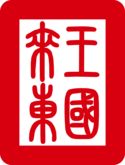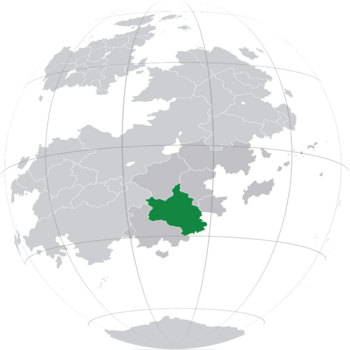Lainan
This article is incomplete because it is pending further input from participants, or it is a work-in-progress by one author. Please comment on this article's talk page to share your input, comments and questions. Note: To contribute to this article, you may need to seek help from the author(s) of this page. |
Kingdom of Lainan 王國勑東 Vương Quốc Lai Đông | |
|---|---|
| Motto: 𧶮天, 𠭤地 Của thiên, trả địa (That which) belongs to heaven, returns to earth | |
| Anthem: 王国𧶮𠀧昆龍𨕭𡗶 Vương quốc của ba con rồng trên trời The Kingdom of the three heavenly dragons | |
| Royal Seal: Royal Seal of Lainan  | |
 | |
| Capital | |
| Largest city | |
| Official languages | Lainese |
| Recognised regional languages | Xiaodongese, Tinzan |
| Ethnic groups (2017) | |
| Demonym(s) | Lainese Lainanese |
| Government | unitary parliamentary monarchy |
• Monarch | Tuy Danh |
• Premier | Ban Bang Sec |
| Legislature | Dai Hoi |
| Formation | |
• First Lai Dynasty | 2779 BCE |
• Unification by Trộm Dynasty | 921 |
• Xiadongese Vassal | 1762 |
• Reconstruction | 1935 |
| Area | |
• Total | 1,893,140 km2 (730,950 sq mi) |
| Population | |
• 2016 census | 87 432 921 |
• Density | 46.2/km2 (119.7/sq mi) |
| GDP (PPP) | 2017 estimate |
• Total | $1.706 trillion |
• Per capita | $16,523 |
| GDP (nominal) | 2017 estimate |
• Total | $1.035 trillion |
• Per capita | $11,849 |
| Gini (2018) | 35.7 medium |
| HDI (2018) | .732 high |
| Currency | Lainese đong (銅, Đ) (LD) |
| Date format | yyyy/mm/dd |
| Driving side | Right |
| ISO 3166 code | LN |
| Internet TLD | .LN |
Lainan oficially The Kingdom of Lainan (Lainese: 王國勑東, Vương Quốc Lai Đông) is a state located in Southeast Coius. It borders the Coral Sea to the south and the Banfura Sea to the east. Its neighbours include Tinza and Xiaodong to the west as well as Cavunia to the north. Its capital city is Dohoa, and its largest city is Taivin City. It is the largest country in Southeast Coius by land area only slightly larger than Dezevau. Lainan is a unitary parliamentary Monarchy with a king as head of state and the army while the premier acts as the head of government. Highest authority within Lainan resides in the democratically elected Dai Hoi. Lainese is the sole official national language of Lainan while numerous minority groups and their languages have regional recognition.
Lainan was first inhabited in the Paleolithic era. Several ancient states of various people groups existed in modern-day Lainan, however through a process of conquest and assimilation, the Lai people became the dominant people group in the area around the 2nd century BC. The Lai people were politically divided between various petty kingdoms that gradually came under Xiaodongese cultural influence in the 200s BCE. This period of petty kingdoms was ended in 548 when most of modern-day Lainan was annexed into the Norzin Empire which led to a 400-year period of Tinzan rule and the spread of Satyism which was brought to an end in 921 when the Trộm dynasty successfully united Lainan thus breaking it away from the empire. Lainan, now partially unified by the Trộm dynasty, began a process of cultural reform where Xiaodongese and Tinzan were largely replaced by Lainese as the language of governance and literature. Despite a period of reform and centralization ranging from 942 to 1237, Lainan would remain a Xiaodongese tributary.
In 1762, Lainan became a vassal to the Toki Sougunate after which it went through a gradual process of Xiadongese vassalhood wherein Lainan was both politically, culturally and economically defined by its subservience to Xiaodong. Lainan was also forced to grant concessions to several Euclean powers culminating in the creation of the Southern EEZ. Discontent towards Lainan's stagnant position led to the creation of the Phuc Hung Society that would later be supported by the Grand Alliance in the Great War. As a result of the war, Lainan was devastated politically and societally which was eased by a multi-national reconstruction effort spearheaded by Senria. Following the reconstruction Lainan became a highly liberal democratic state largely in order to attract more international support and investment.
Lainan is a democratic monarchy that is a member of the Community of Nations as well as the International Council for Democracy. It is also an active member in COMSED and is considered one of COMSED's success stories. Lainan is considered a developing country with a modest standard of living. Due to its liberal economic policies and continued international investment, Lainan ranks consistently as one of Kylaris' fastest growing economies but it faces challenges such as inadequate welfare and unequal regional economic development.
Etymology
The name Lai Đông (勑東) is a variation of the Xiaodongese Dialect name of Yuǎn Dōng Loi (远東勑) where "Yuǎn Dōng" (远東) means fareast and "Loi" (勑) refers to the Lai people that inhabited the area. Through interaction between Coian and Eucelan traders the endonym Lai Đông became the exonym Lainon which later developed into Lainan. The earliest recorded incident of the usage of the term "Lai Đông" was by the historic poet Anh Sec who used the term to refer to the general area where the various Lai kingdoms were.
Geography
Climate
Environment
History
First Lai Dynasties
Early Tributary Lainan
Norzin Rule
Late Tributary Lainan
Lainanese Liberation War
Reconstruction
Contemporary Lainan
Politics
Government
 |

|
| Tuy Danh Monarch since 1999 |
Ban Bang Sec Premier since 2014 |
Lainan is a democratic unitary state where the highest authority is vested in the democratically-elected unicameral Dai Hoi or Great Diet. The monarch acts as the head of state although possesses few powers aside from appointive and diplomatic duties. The premier acts as the head of the executive branch and governs with the consent of the Dai Hoi.

